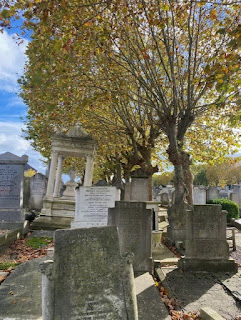I am writing this in a cemetery, something I can highly
recommend if you value silence and beauty and space to think. The only sounds are the rustling of leaves, the rather unexpected raucous cries of parakeets, and the tap tap tap of writers at their laptops.
I’m here at Willesden Jewish Cemetery because for the first time in its 150
year history, it is running a four day writers’ retreat, an opportunity I could
not miss, although I can only be spared one day from my day job. I have a lot
to write - this blog post, two articles (I haven’t been completely freed from
the day job). I'm also going to try to make time at the end to write a little bit of fiction, but that might be difficult. Rarely have I found it so difficult to escape into an imaginary world, just at the time when I need it the most.
At lunchtime I had a wander around the grounds, trying to spot the most famous graves. There’s Rosalind Franklin, who worked on the discovery of DNA, there are artists Mark Gertler and Simeon Solomon, there’s Harriet Samuel who took over her husband’s clock-making business and turned it into the H Samuel chain of jewellers shops. Jane Joseph, who has the grave next to Rosalind Franklin, was a musician and composer. Eliza Davis (1816-1903) took exception to Charles Dickens’ portrayal of Fagin in Oliver Twist and wrote to tell him so persuasively that he tried to edit the book post publication and wrote far more sympathetic Jewish characters in subsequent publications.
The National Jewish War Memorial is here too, bearing
witness to the contribution of Jewish soldiers fighting for Britain, and there
are Commonwealth war graves from the two World Wars. There are Chief rabbis and
Rothschild aristocrats, merchants and musicians, politicians and communal leaders. The story of the cemetery is one of a minority community keen to integrate, aping the ways of
Christian Victorians (the prayer hall and other buildings seem almost comically
churchy to me) even in the way some of the the gravestones are shaped and
decorated. I've never seen urns and pillars and swags of stone ivy in other
Jewish cemeteries.
The cemetery is a symbol of success, a community proud of itself and its growing place in British society. Here are the foundations of the community I am part of today. I have always felt so lucky to be British, so appreciative
of the safe, cultured liberal society around me. Typing those
words though, here in the silent cemetery brought tears to my eyes. Because it
no longer feels altogether safe to be Jewish in my home city. And now I wonder how and why
I ever thought it was safe at all.
The signs have been there for ages. We’ve always had guards on Jewish schools and synagogues. We’re used to having
our bags checked on our way in to
communal events. We tend to minimise the tiny ‘micro-aggressions’ of everyday life - the snobby friend who thinks Jews are vulgar,
the earnest neighbour who assures us that he admires the Jewish people because
they are so good at making money -
because silly remarks won’t kill us. And we know from collective memory,
from family stories, from understanding our own history, what it is like when
people do try and kill us.
But now things have changed. The threats feel immediate and real. Since the atrocities in Israel on October 7, security has been stepped up - in the office where I work, the synagogue I attended last week, the community centre I was at the week before. Even at my dad's old age home.
It sometimes feels as though no one would be very much bothered if our fears came true, if there was an attack. If we died as our people died on October 7. Because it often feels as though the Jews are blamed for everything, including our own deaths. (If you think I am paranoid, you should see my mailbox at work where a vexatious complainer is persistently suggesting just this).
But! I hear you say (even here in the silence of the cemetery I can hear you). the suffering of the people of Gaza is unbearable, there must be a ceasefire now. All we want is peace, peace, peace. And yes, it is indeed unbearable, but how do you achieve peace when the hostages are not free? When Hamas have said that they want to kill every Jew in the world? We believe them, why wouldn't we? We don't have the privilege of giving them the benefit of the doubt.
When I wander through the quiet and beautiful pathways of Willesden Jewish
Cemetery I think about the gravestones of my ancestors in Poland, broken up and
used as cobblestones by the Nazis. And I see ancient hatred stir in some British people's hearts, and a blindfold of ignorance cover
the eyes of others. I try to be optimistic, I pray for peace. But the peace
of the graveyard is not the right sort and it’s so much harder to achieve
peace for the living.




1 comment:
I am so sorry, Keren, that you have to live with this indefensible (and dangerous) bullshit. I share your fear that the world is taking a nose-dive back into all that fear-driven hatred and I don't know what we can do to stop it.
Post a Comment